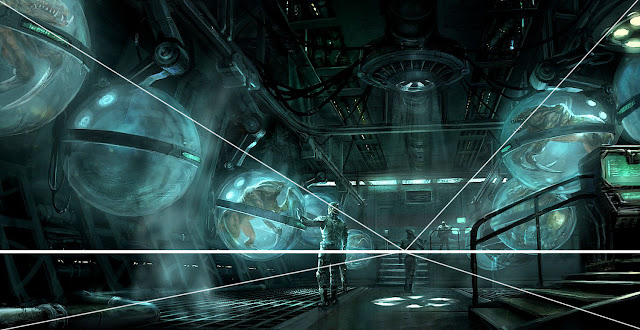Delving into
concept art, the bases of this project is gaining a beginning knowledge into planning world creation. As creating a new environment from imagination
can be quite daunting, instead we were given several texts from Italo's
Calvino's book, "Invisible Cities". Each passage of literature
contains a description of a settlement, detailing it's construction, ambience
and the inhabitants that live within. Following this, we were tasked with
creating over 100 thumbnails. As 13 cities where given, this meant there had to
be at least 10 designs each, stopping at 100 would not have been enough. Once
completed, we were able to choose a city that invoked the most powerful
thumbnails and develop influence maps. These influence maps (board boards) help
in creating a more in-depth idea into the city, bringing in colour pallets and
small details. I decided on Diomira, the city of silver domes. I chose this one
as it was the most enjoyable to sketch and allowed some freedom in vision.
Participating in perspective exercises gave a better understanding in
composition, while participating in master painting studies and colour theory
means we can understand how hues can create the illusions of distance. Having
tutor input throughout our progress gave us insight to areas that was going
well and support in ones that needed a little tweaking. With all these
elements, we are presented with a starting point to create three final digital
paintings of our chosen city. There is a criterion to what angles need to be
illustrated for the concept. They are an exterior establishing shot, an
interior one and a low angle establishing view.
Thinking about what went well over this
assignment, the quality of the thumbnails enabled a good amount of detail for
later stages. At first, the prospect of creating so many designs seemed
off-putting. However, I found once I had started doing the thumbnails, they
began to come me quicker and developed more expression each time. In the final
paintings, when doing the main sketches, I could see my perspective planning
showed some improvement. doing the perspective exercises allowed for this. The
Thumbnails and digital paintings gave room for experimentation in styles, and
though this I found what worked best for me at this time. Originally starting
in soft shading, I found that cell shading to be much more beneficial and
created a better range in detail and tone. The second development of the
interior shot showed a better understanding in creating a lived-in
establishment, and the composition actually invites viewer in as part of the
scene.
However, there isn't as much detail as I
would have liked in these final pieces. The first one (having done hardly any
digital painting before) is far too symmetrical. The clouds, trees and statue
have no presence, and the softly softly shading doesn't hold any presence. The
mirror tool I learnt, is not the best for environment concept. I had used it
far too much, making a boring and mundane composition. Also, I seemed to have
underestimated how much time research can take, leaving me with much less time
for the final paintings. Being unimpressed with my previous compositions meant
a complete re-planning of my final two pieces, taking up more time the
intended. Due to this, I didn't have time to create a new colour scheme or
lighting plan for them, so it was a small case of hoping for the best and
relaying on intuition.
Although there is a lot wrong with the first
digital painting, I have chosen not to change it. This is something to learn
from, and acts as visual way of not making these errors again. To improve from
this project, more practise in Photoshop will help gain better knowledge in
blending modes and detailing. Also, the continuation of perspective exercises
will help in creating more dynamic and natural environments. In my spare time,
following some tutorials will continue these developments and boast my skills,
eventually boast my productivity.




















































